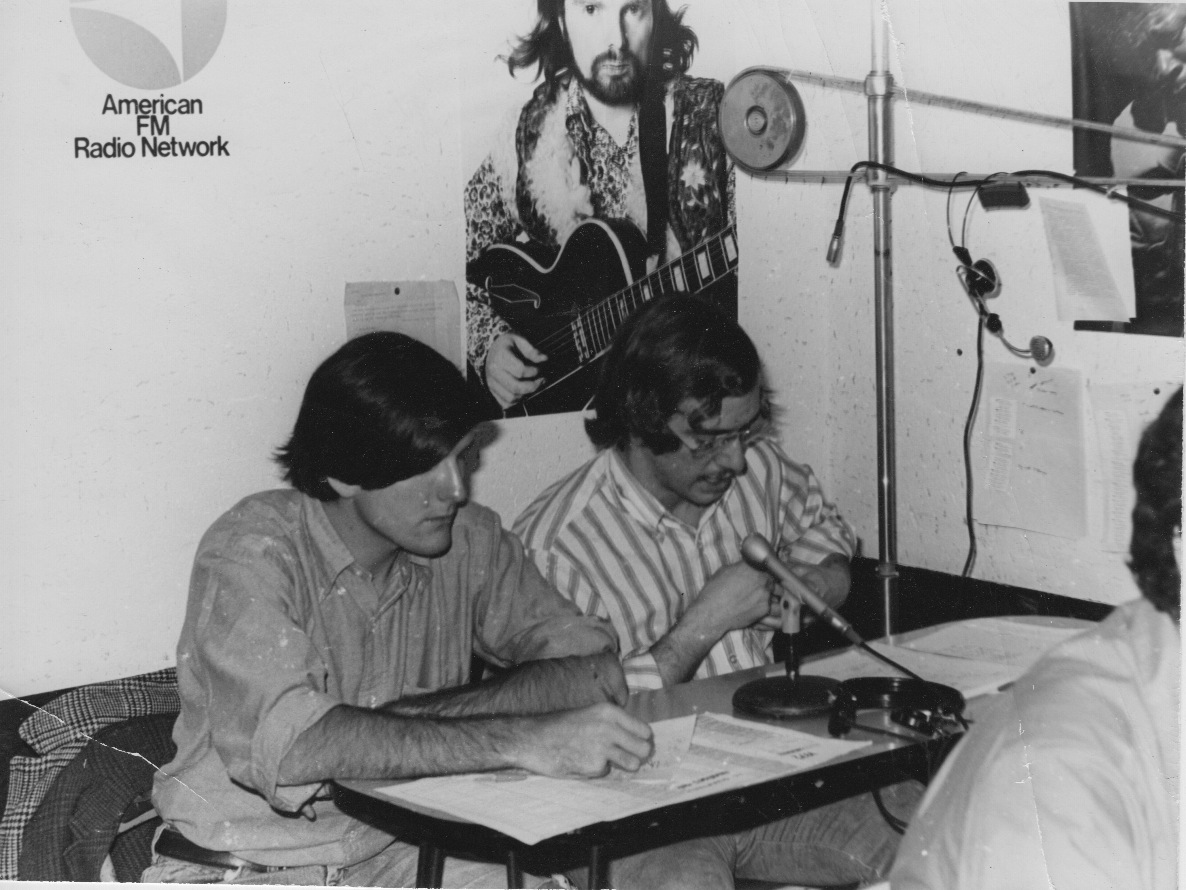WPRB DJs Arrested in Washington, 1970

[Jeff Weiser (left) and Bruce Snyder help cover the 1972 election live on the air.]
By Douglas B. Quine
I joined WPRB in my freshman year of 1969-1970 and trained on WPRB-AM before serving as a newsman at the May Day protest demonstration in Washington (1970) and the election night headquarters of Nixon and McGovern (1972). In Princeton, I took on the folk & blues shows on WPRB-FM, served as Traffic Director and assistant business manager, and finally served on the Ivy Network Board of Directors.
I have many memories of WPRB, including lighting fluorescent lamps by the radiated antenna power on Holder Tower, talking with stoned listeners who called into the studios, organizing the Beach Boys, Fish, Jean Shepherd, Weather Report, & Poco concerts, and the first WPRB Tee Shirts (blue shirts with a yellow smudge at the bottom which was supposed to represent a voice print). The stories that I’ve retold the most times, however, must be the “WPRB arrests in Washington” and “The Do Me Bird”.
In 1970 as a new member of WPRB, I did not yet have the official color photograph State of New Jersey Press Pass approved by the South Jersey Police Chiefs Association which I obtained in 1972 as a more senior member of the station. For this reason when I went as one of three newsmen to cover the People’s Coalition for Peace and Justice May Day demonstrations, I had only the standard orange WPRB ID card.
We arrived by bus in Washington DC and had been walking down the street no more than 5 minutes when a police patrol stopped us and placed us under arrest for blockading the Arlington Street bridge. We objected pointing out that the bus tickets which we still held in our hands proved that we had not been in town long enough to have been involved in any such illegal activities and that furthermore we were members of the press. The officer only responded that he was sure that if we hadn’t blockaded the bridge, we probably wished we had, and were under arrest anyhow. Our explanations seemed to fall on deaf ears and my colleagues’ official press passes with their fine print were equally useless. I, however, showed my bright orange and black unofficial WPRB ID card. The large block letters WPRB Radio served their purpose well and I was released while the other went off to jail! For the next couple of days, I called in reports by phone to the station, postponed my history term paper, dodged tear gas attacks, watched military helicopters land at the Washington monument, and asked the station to locate the others and arrange legal representation. Eventually the demonstrations ended, the others were released on bail, and we all returned to Princeton.
A few weeks later we all returned to Washington DC for the trial/hearing. We went down early and met at the Lafayette Square offices of a law firm with a Princeton connection to review the facts of the case and prepare the defense. Naturally the attorney was astounded to hear the story although the news reports that Richard Nixon had demanded that Attorney General Mitchell prosecute all of the demonstrators did explain how it was that some 17,000 arrests had been made and that students were now returning from all over the country to defend their names for 50 or so dollars bail money.
We went to the hearing and some 300 other demonstrators were there. The young judge called up the first defendant and then called out for the arresting officer – “John Lyons”. The prosecutor responded that the officer was not present. When the judge demanded to know why, since the defendant had come all the way from Minnesota to defend his name, the prosecutor explained that there had been so many arrests that day that they had lost track of the arrests and a fictitious name had been used for the arresting officer. The judge, naturally, was furious and dismissed the case. This process continued for each of the defendants and late that day we returned home.
Around 1972, my roommate Bob Baker, ran the popular top 40 show each Saturday night which attracted a large following among the high school and college audience. It was a much higher quality show than one encountered on the other radio stations and included a variety of very well produced clips. One night Marshall Millsap (’74) was reading the news when Bob decided to comment upon Marshall’s exceptionally resonant and authoritative voice. The control room engineer (this show had a separate announcer and engineer) recorded Marshall’s voice and at the end of the news played a tape loop of “I’M MARSHALL MILLSAP” several times. Marshall, of course, loved it and soon was coming onto the microphone with a squeaky voice demanding that the tape be played again and again. Soon this squeaky voice was dubbed the “Do Me Bird” and there was a contest to draw a portrait of this beast! The winner, as I recall, drew a magnificent picture that looked somewhat like “Big Bird” on Sesame Street.
